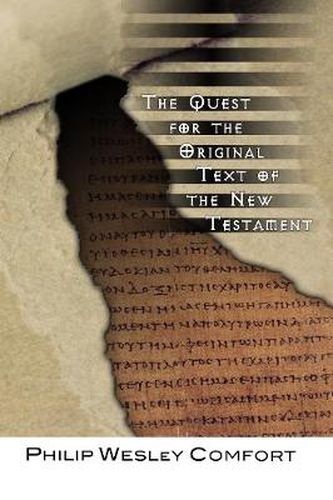Readings Newsletter
Become a Readings Member to make your shopping experience even easier.
Sign in or sign up for free!
You’re not far away from qualifying for FREE standard shipping within Australia
You’ve qualified for FREE standard shipping within Australia
The cart is loading…






If only we could hold the actual words of Luke’s descriptive narrative or Paul’s outpouring of pastoral pain to the church at Corinth. Now we can. A continuing quest to recover the New Testament text allows Christians to open their Bibles with confidence that the words approximate the writers’ Greek quill strokes or the English equivalents. Such thought breaths excitement into Philip Comfort’s history of the New Testament text and discussion of the credibility (and limitations) of texts and translations. Comfort challenges the view that early copyists were careless and took editorial liberties. He argues that their accuracy and integrity are indisputable. While this task involves comparing manuscripts, technical facts are framed in historical and cultural color. He assures Christians that even uncovering the paper signed by Paul would not change our understanding of what he said. This introduction to the work of textual criticism challenges students to continue the quest for the original text. It is essentially a sequel to ‘Early Manuscripts and Modern Translations of the New Testament.
$9.00 standard shipping within Australia
FREE standard shipping within Australia for orders over $100.00
Express & International shipping calculated at checkout
If only we could hold the actual words of Luke’s descriptive narrative or Paul’s outpouring of pastoral pain to the church at Corinth. Now we can. A continuing quest to recover the New Testament text allows Christians to open their Bibles with confidence that the words approximate the writers’ Greek quill strokes or the English equivalents. Such thought breaths excitement into Philip Comfort’s history of the New Testament text and discussion of the credibility (and limitations) of texts and translations. Comfort challenges the view that early copyists were careless and took editorial liberties. He argues that their accuracy and integrity are indisputable. While this task involves comparing manuscripts, technical facts are framed in historical and cultural color. He assures Christians that even uncovering the paper signed by Paul would not change our understanding of what he said. This introduction to the work of textual criticism challenges students to continue the quest for the original text. It is essentially a sequel to ‘Early Manuscripts and Modern Translations of the New Testament.